Daily Vocabulary Words: Enhance Your Lexicon with Leading Newspapers & Publications
Welcome to the Daily Vocabulary section at Wordpandit!
Our mission is straightforward: to bring you essential vocabulary words featured in top newspapers and publications worldwide. By focusing on words you’ll encounter in renowned sources, we aim to help you enhance your vocabulary effectively and practically.
Our selection includes words from:
– The New York Times
– The Washington Post
– Scientific American
– BBC
– The Guardian
– Psychology Today
– Wall Street Journal
– The Economist
– The Hindu
– The Times of India
– The Economic Times
– Hindustan Times
– Live Mint
– The Indian Express
– And many more.
We are committed to your vocabulary development. Simply visit this section regularly and explore the daily posts. This is your go-to repository for commonly used words, providing significant practical benefits by familiarizing you with vocabulary from the leading publications listed above.
Make it a habit to visit our website daily and expand your lexicon with words from top newspapers and publications. (edited)
WORD 1: Foresee
CONTEXT: The political situation varies from State to State. For example, in Tamil Nadu, one does not foresee many problems, even though there are speculations that the Congress may ask for more seats than they fought in 2019.
SOURCE: The Hindu
EXPLANATORY PARAGRAPH: Imagine if you could look at a cloudy sky and know that it’s going to rain before it even starts. That’s what it means to foresee something—you can guess or predict what will happen before it actually does, like being able to tell the future!
MEANING: To know or predict what will happen in the future (verb)
PRONUNCIATION: for-SEE
SYNONYMS: anticipate, predict, forecast, envision, expect, foretell, divine
USAGE EXAMPLE:
1. The weather forecast helps us foresee if we need an umbrella.
2. He could foresee the problems that would come from the decision.
3. The company tried to foresee future market trends.
4. She couldn’t foresee how much she would miss her old home.
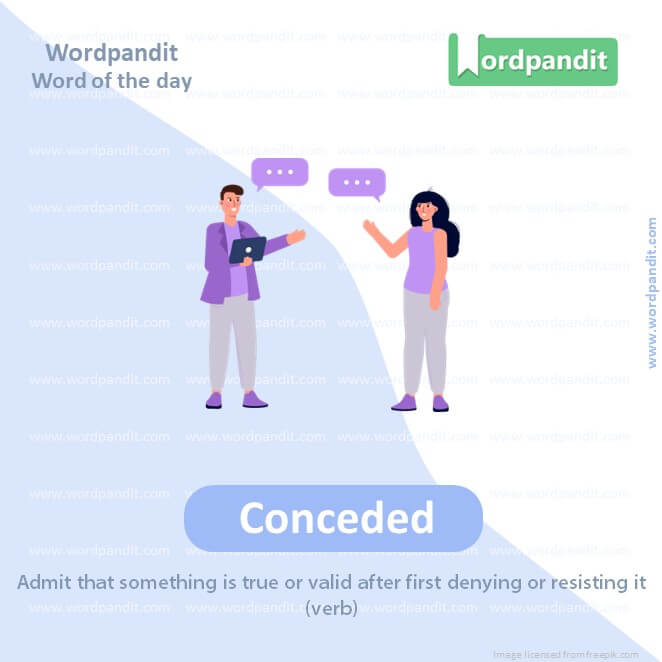
WORD 2: Conceded
CONTEXT: Telangana is the only State out of the five that went for Assembly elections recently where the Congress conceded seats for an ally. Are there any lessons there?
SOURCE: The Hindu
EXPLANATORY PARAGRAPH: Imagine playing a game and realizing that you can’t win, so you tell your friend, “You win!” That’s what it means to concede—you admit that you didn’t win or that someone else was right.
MEANING: Admit that something is true or valid after first denying or resisting it (verb)
PRONUNCIATION: kun-SEED-ed
SYNONYMS: admitted, acknowledged, yielded, surrendered, accepted, granted, allowed
USAGE EXAMPLE:
1. After a long argument, he conceded that his sister was right.
2. The candidate conceded the election when the results became clear.
3. She finally conceded that she needed help with her project.
4. He conceded the point but still had his doubts.
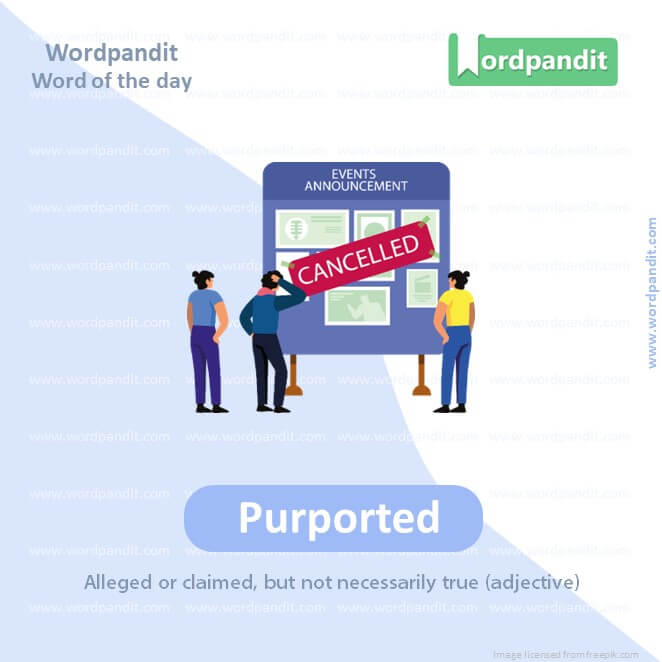
WORD 3: Purported
CONTEXT: It says that Governors shall not be answerable to any court for the exercise and performance of the powers and duties of their office or for any act done or purported to be done by them in their official capacity.
SOURCE: The Hindu
EXPLANATORY PARAGRAPH: Imagine someone tells you that there’s a treasure hidden under a tree, but you’re not sure if it’s true or not. If something is purported, it means it’s said to be true, but we don’t know for sure if it really is.
MEANING: Alleged or claimed, but not necessarily true (adjective)
PRONUNCIATION: pur-PORT-ed
SYNONYMS: alleged, supposed, claimed, reported, rumored, stated, asserted
USAGE EXAMPLE:
1. The purported discovery of the artifact turned out to be a hoax.
2. She is the purported owner of the mysterious mansion.
3. The purported benefits of the new policy are still under debate.
4. He was the purported leader of the group, though this was never confirmed.
WORD 4: Whimsical
CONTEXT: In Rameshwar Prasad v. Union of India (2006), after finding that the Governor abused power in recommending Presidential rule in Bihar, the Supreme Court said that the motivated and whimsical conduct of the Governor is amenable to judicial review.
SOURCE: The Hindu
EXPLANATORY PARAGRAPH: Imagine a fairy who loves to do funny, surprising things like making flowers dance or painting the sky different colors. Being whimsical means you like to do things in a fun, creative, and sometimes unexpected way, just like that fairy!
MEANING: Playful, imaginative, or unpredictable, often in a way that is fun or charming (adjective).
PRONUNCIATION: WIM-zih-kul
SYNONYMS: playful, fanciful, capricious, quirky, imaginative, fanciful, eccentric
USAGE EXAMPLE:
1. The whimsical decorations at the party made everyone smile.
2. Her whimsical drawings are full of colorful creatures and fantasy worlds.
3. The book is full of whimsical stories that delight children.
4. He has a whimsical habit of wearing mismatched socks.
WORD 5: Amenable
CONTEXT: In Rameshwar Prasad v. Union of India (2006), after finding that the Governor abused power in recommending Presidential rule in Bihar, the Supreme Court said that the motivated and whimsical conduct of the Governor is amenable to judicial review.
SOURCE: The Hindu
EXPLANATORY PARAGRAPH: Imagine you want to play a new game, and your friend says, “Sure, that sounds fun!” Being amenable means you are open to new ideas or willing to do what someone else suggests.
MEANING: Open and responsive to suggestions or willing to agree or accept something (adjective).
PRONUNCIATION: uh-MEE-nuh-bul
SYNONYMS: agreeable, cooperative, receptive, responsive, compliant, open, flexible
USAGE EXAMPLE:
1. She was amenable to the idea of changing their plans.
2. The team was amenable to suggestions from their new coach.
3. He found the committee surprisingly amenable to his proposal.
4. The manager is always amenable to feedback from the staff.
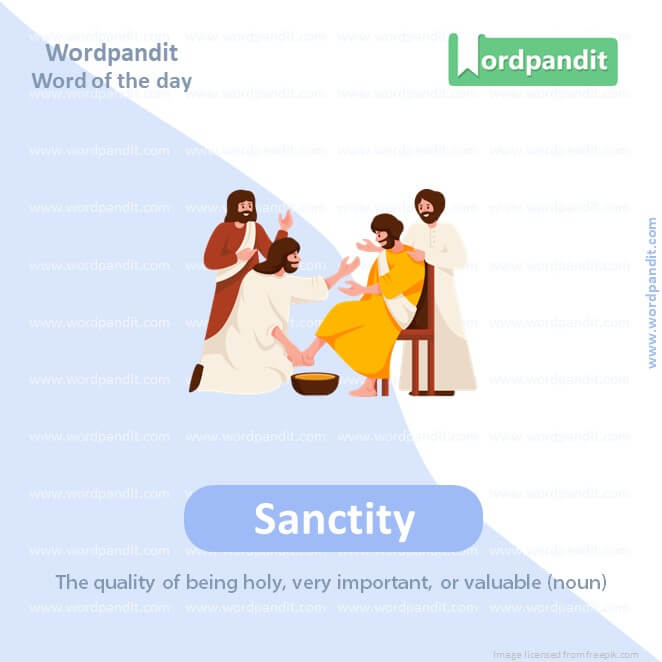
WORD 6: Sanctity
CONTEXT: However, the Court said that “right persons” should be chosen as Governors for maintaining “the sanctity of the post”.
SOURCE: The Hindu
EXPLANATORY PARAGRAPH: Think of a place like a church or a quiet room where you feel like you have to be extra respectful because it’s very special. That feeling of being in a place or situation that is really important and deserves respect is called sanctity.
MEANING: The quality of being holy, very important, or valuable (noun)
PRONUNCIATION: SANK-tuh-tee
SYNONYMS: holiness, sacredness, inviolability, purity, divinity, piety, reverence
USAGE EXAMPLE:
1. The sanctity of the temple was preserved by the faithful.
2. They spoke about the sanctity of life during the ceremony.
3. She respected the sanctity of the ancient traditions.
4. The sanctity of the courtroom must be maintained at all times.
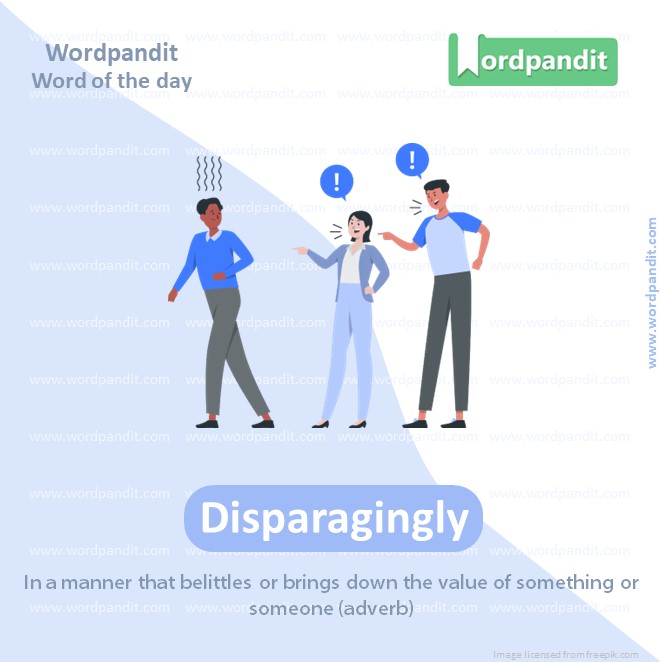
WORD 7: Disparaging
CONTEXT: Questions relating to disparaging comments by public functionaries came up for consideration before the Supreme Court in Kaushal Kishor v. State of Uttar Pradesh (2023).
SOURCE: The Hindu
EXPLANATORY PARAGRAPH: Imagine someone says something mean about your drawing, like “It’s not that good.” That’s called a disparaging comment—it’s when someone says something that makes another person or thing seem less important or good.
MEANING: In a manner that belittles or brings down the value of something or someone (adverb)
PRONUNCIATION: dis-PAIR-uh-jing
SYNONYMS: belittling, derogatory, demeaning, critical, denigrating, slighting, scornful
USAGE EXAMPLE:
1. His disparaging remarks about the book upset the author.
2. The article was full of disparaging comments about the actor.
3. She ignored the disparaging remarks from her classmates.
4. The politician made a disparaging statement about his opponent’s ideas.
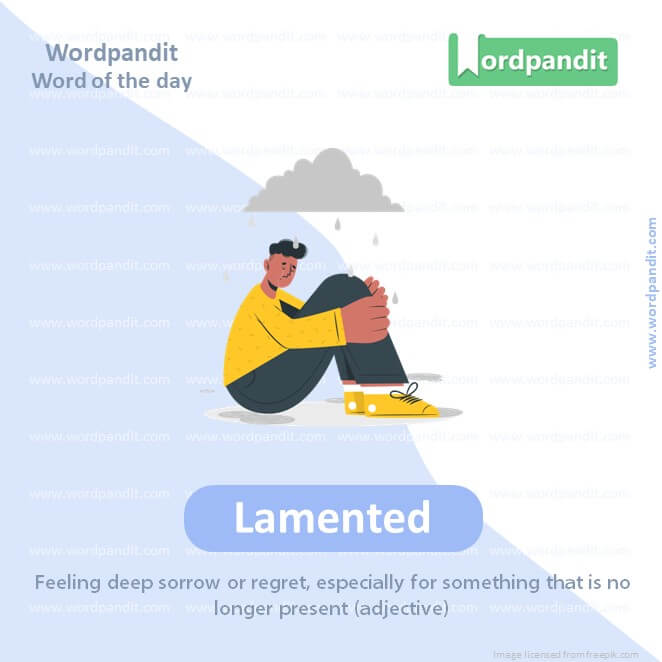
WORD 8: Lamented
CONTEXT: The Sarkaria Commission Report (1988) lamented that “some Governors have failed to display the qualities of impartiality and sagacity expected of them”.
SOURCE: The Hindu
EXPLANATORY PARAGRAPH: Imagine you had a favorite toy that broke, and you felt really sad about it. To lament is to feel or express deep sadness or regret about something, especially something that has been lost.
MEANING: Feeling deep sorrow or regret, especially for something that is no longer present (adjective)
MEANING: Someone who is mourned or missed, especially after their death (adjective).
PRONUNCIATION: luh-MEN-ted
SYNONYMS: mourned, grieved, bemoaned, wept, regretted, sorrowed, bewailed
USAGE EXAMPLE:
1. The old man lamented the loss of his childhood home.
2. She lamented that she couldn’t attend the concert.
3. The community lamented the passing of their beloved leader.
4. He lamented over the missed opportunity for years.
WORD 9: Sagacity
CONTEXT: The Sarkaria Commission Report (1988) lamented that “some Governors have failed to display the qualities of impartiality and sagacity expected of them”.
SOURCE: The Hindu
EXPLANATORY PARAGRAPH: Imagine a wise old owl who always knows the right thing to do, even when things are tricky. Sagacity is like that owl’s wisdom—it means being really smart and making good decisions because you’ve learned a lot over time.
MEANING: The quality of being wise, having sound judgment, and understanding things deeply (noun).
PRONUNCIATION: suh-GAS-i-tee
SYNONYMS: wisdom, insight, discernment, prudence, knowledge, understanding, shrewdness
USAGE EXAMPLE:
1. The leader was known for his sagacity in difficult times.
2. Her sagacity in choosing the right path helped the project succeed.
3. The judge’s sagacity was evident in her fair decisions.
4. He was admired for his sagacity and thoughtful advice.
WORD 10: Gubernatorial
CONTEXT: This happened after he sat on the Bills for a long time and after the government moved the Supreme Court praying for gubernatorial assent.
SOURCE: The Hindu
EXPLANATORY PARAGRAPH: Imagine a big race where people are competing to become the leader of a state, like the boss of a big group. The word gubernatorial is used to talk about things related to this race or the job of being the leader of the state.
MEANING: Relating to a governor or the office of a governor (adjective).
PRONUNCIATION: goo-ber-nuh-TOR-ee-ul
SYNONYMS: governor-related, administrative, executive, authoritative, governing, political, leadership-related
USAGE EXAMPLE:
1. The gubernatorial election will decide the next leader of the state.
2. He’s running a strong gubernatorial campaign.
3. The governor delivered her gubernatorial address to the public.
4. Gubernatorial responsibilities include overseeing the state budget.
Vocabulary Daily Use
In the fascinating world of language learning, we often concentrate on taking giant leaps, but the real magic lies in the small steps of ‘vocabulary daily use’. These frequently used words and phrases form the backbone of practical communication and understanding. Therefore, mastering ‘vocabulary daily use’ is a crucial element in achieving language fluency.
To effectively learn ‘vocabulary daily use’, one needs to venture beyond the traditional textbook resources. The real essence of these words unveils itself in everyday exposure and interactions. Engaging with a variety of material like novels, magazines, newspapers, podcasts, films and digital content deepens the understanding of ‘vocabulary daily use’. Immersion in these contexts yield natural, everyday language that bridges the gap between the classroom and the real world.
The journey of mastering ‘vocabulary daily use’ necessitates the integration of innovative memory techniques. Flashcards and the Leitner System aid in embedding these words into your long-term memory by promoting active recall. Additionally, the use of mnemonic devices, which allow you to associate ‘vocabulary daily use’ with personal and familiar narratives, can enhance your ability to remember and recall these words.
Moreover, it’s important to remember that ‘vocabulary daily use’ isn’t just about comprehension- it’s about practice and active usage. Incorporate these words in your day-to-day communication and social interactions. This not only solidifies your understanding but also accelerates learning and internalization of ‘vocabulary daily use’.
In a nutshell, mastering ‘vocabulary daily use’ is a continual process that demands exposure, creative learning strategies and assertive practice. The commingling of these tactics brews the perfect formula that allows learners to seamlessly integrate ‘vocabulary daily use’ into their linguistic repertoire. And with that, they can navigate the nuances of language with confidence and ease.













